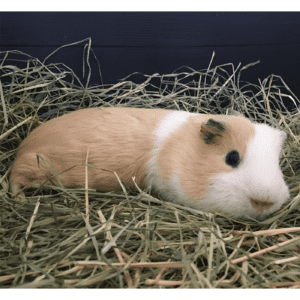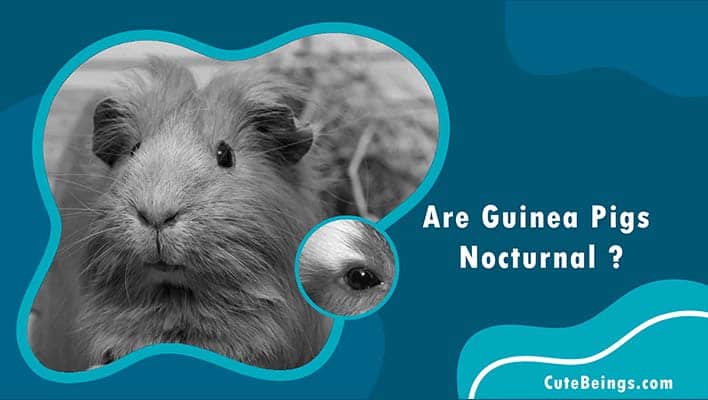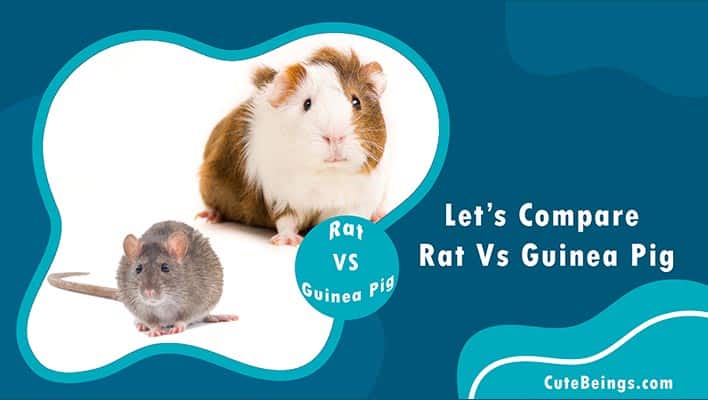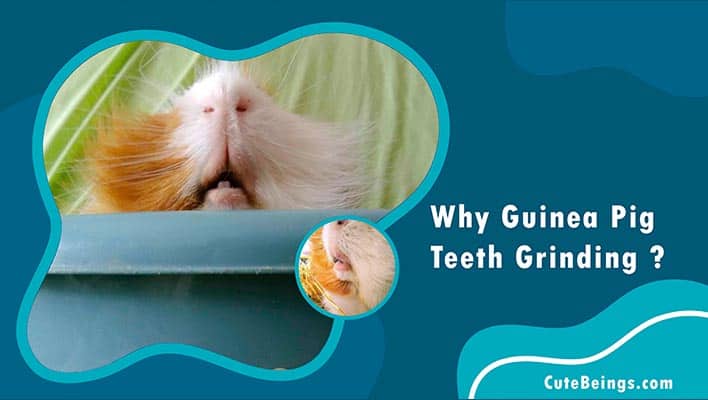How much do you know about sleeping patterns or sleeping habits animals? If you lack of information about it or if you don’t have a clear idea about this let me introduce you some basic information. Though there are a lot of sleeping habits which are different from each other, essentially a pet can show nocturnal, diurnal or crepuscular behavior. To the question “Are guinea pigs nocturnal” can’t be given a straight forward answer.
There could be many factors that could affect on sleeping patterns but mainly the environment of animals and its status which is predator or a prey animal decide its sleeping behavior.
Guinea pig is not really a nocturnal or diurnal animal. They are most likely to have short naps and a lot more energetic during the day than night.
Table of Contents
How Do Guinea Pigs Sleep?
The wonderful thing is this rodent sleeps with its eyes open and in reality guinea pigs close their eyes very rarely. They can sleep in almost every awake position. This is due to their instinct behavior to identify any danger and escape in seconds.

As other rodents, guinea pigs are prey animals and must remain cautious against their predators. Mostly prey animals and their predators become accustomed to each other’s sleep schedule. Predators are likely to stay awake when their prey animals are available. However prey will try to avoid its primary predators when they are out hunting.
Wild guinea pigs and domesticated guinea pigs always look out for predators such as cats, snakes, birds of prey, wolves and coyotes.
It is obvious that guinea pigs always try to stay away from their predators when they are awake. At night, they can wonder around and play peacefully having no troubles from their predators if guinea pigs can avoid their predators’ awake time.
Unfortunately many of rodent predators are nocturnal and naturally guinea pigs get used to be active when their predators sleep or just about to wake up. If guinea pig is a fully nocturnal animal, it could be searching for foods at the same time as its predators and that could lead to unfortunate results.
With the time, guinea pig behavior has become cautious and developed a tremendous alertness to its predators and to danger. They usually sleep for a short time and there is a slight risk that a predator would come on hunting while they are in sleep. As they are having short naps, they have more time in surviving from predators.
In some occurrence you have noticed that your pet guinea pig close its eyes partially or fully and doesn’t move at all then your pet rodent may be relaxing. Also they lay their heads down, hideaway in some bedding or lie on their sides when they think of short naps.
You will find it hard to see your domestic guinea pig sleeping because they mostly sleep with their eyes open. It is very rare they shut their eyes, they only do it if there are very relaxed. It is very ordinary them to sleep while standing still. If you find a domesticated guinea pig lying down that means there is a serious issue with it.
How Long Normally Guinea Pigs Sleep?
When sleeping habits are considered guinea pig sleep is enormously strange. Also it is very different when it is compared to human sleep. It’s even different from other rodent’s sleeping pattern. Generally guinea pigs take short naps among periods of higher activity throughout in a 24 hour cycle.
There is no need of lengthy sleep for guinea pig as humans do. Their behavior shows that these social animals know it too. Basically guinea pigs sleep about 4 to 6 hours a day.
Studies have discovered that even among other rodents guinea pig need very little of sleep sometimes few minutes are also enough for them.
One study shows that guinea pigs need only one hour of REM which is known as “rapid eye movement” in 24 hours, when compared to ferret’s need of six hours of REM.
Throughout the daylight and the night these pet rodents sleep in very small intervals. These intervals can expand from few seconds to 10 minutes. Longest intervals can last up to 30 minutes. These long intervals are very rare and you can notice this when your piggy is calm and extremely sleepy.
A young guinea pig usually sleeps shorter intervals than an adult guinea pig. When guinea pigs age, they tend to sleep more during the day.
Where Does Your Domestic Guinea Pig Sleep?
Guinea pigs are not the creators of burrows of their own but they do search protection in burrows which are made by other animals. Natural tunnels and crevices are great places for them. Creating a natural environment of the guinea pig will be a very hard task.
But as the guinea pig owner, you can create a safe sleeping space for your cavy by allowing one or more hideaways. This nest is similar to hamster cage and can be created with unfurnished wood and plastic. There are plastic made and wooden made cages you can buy in pet store and choosing a wooden guinea pig cage will be the best thing for you piggy because if your guinea pig needs to chew its cage he can do it in safety.
Keep the hideaway in darkest place in the cage. They usually prefer to sleep in darker places for a long time in the cage though they can sleep anywhere.
How You Can Support Your Guinea Pigs Sleeping?
As mentioned earlier, safety is crucial for your guinea pig to sleep, but there are some other vital measures you need to be aware of
-
Location of the cage- you need to place the cage where it could experience both day and night light. Do not keep the cage in a bedroom unless you want to disturbed during the night.
-
Avoid fatigue- guinea pigs can be fed up if they have nothing to do. You need to provide enough room in the cage and toys so your cavy can play and be energetic as your guinea pig is up and running most of the day. Here comes the fun fact, allocate some time for cuddling and playing with your pet each day.
-
Do not disturb your guinea pig’s sleep- As discussed before it is very hard to identify whether your cavy is sleeping. Reduce noises as much as you can if you intend to stay at home during the day. If there is much noise all day long, your rodent could be frustrating and disappointing and also will not get enough sleep.
-
Maintain suitable temperature- Guinea pigs were originated from South American environment. In their usual surroundings temperature fluctuates from room temperature to below freezing. These rodents do not like cold or hot weather and will hide in their burrows when it feels too hot or too cold. Direct sunlight never works out for guinea pigs. Keep the cage in a shady are but still should be able to get some light. Room temperature of 24C or 75F is extremely important as guinea pigs can be heated easily than any other pet. The ideal temperature can be considered close to 65F or 18.3C but it could give chills to your pet. If you notice any changes such as lesser energy, augmented heart beat or breathing, violent guinea pig behavior and changes in sleep pattern that means your pet is overheated.
-
Your pet would start peeping, squeaking and making whistling sounds if you haven’t offer enough guinea pig needs for the night. This communicates that they are running low on food and water or they feel lonely by missing you. If you don’t want your pet to keep you waking up, provide enough fresh food such as grass hay and water before you go to sleep.
Study And Monitor On Their Sleeping Habits
Finally every guinea pig is unique and deviations are expectable. It is vital to study your guinea pig’s ordinary sleep patterns.
This will help you to monitor unexpected changes in their schedules and that could be a sign that your cavy isn’t feeling well.
Sudden changes to watch out includes:
-
comprehensive periods of laziness
-
differences in sleeping pose
-
feeling less energetic
-
increased breathing rate
Can Guinea Pig’s Diet Cause Sleepiness?
Every animal needs suitable nutrition so they can grow and maintain their usual routine. If your pet can’t sleep at night or show any symptoms that make him feel disturbed, it can denote that your pet is missing vitamin C during the daytime.
In such situations you need to check your guinea pig’s diet. Mainly lethargy is linked with vitamin C insufficiency. This deficit can lead to joint and muscle pain also this can cause inactivity.
Vitamin C is very vital to joints, muscles and for their typical functions. If guinea pig is suffering from joint or muscle pains their last option will be sleep as it could ease the pain.
Many commercial guinea pig food products contain fine quantity of vitamin C. But storing them in bright, wet and warm places can decrease the nutrition. The age of food also can have an effect on Vitamin contained in food.
A professional wet can do an easy blood analysis to identify vitamin C deficiency in your pet. If your pet is suffering from vitamin deficit you can buy special food items which contain proper amount of vitamin or you can get some vitamin C tablets. Before commencing any of these treatments you must always get your veterinarian’s opinion to get proper quantity of Vitamin C.
Sleeping With Your Guinea Pig In The Same Room
This speaks about a real life situation of a pet owner. If you keep your pet’s cage in your room it is expected that you will be disturbed by your cavy’s scratching in its cage or the food. If you have several guinea pigs they could be playing all the time with each other and that also will be a disturbance to your sleep.
One solution is you can encourage your guinea pig to sleep for longer periods as you do but remember they will never have 8 hour sleep. If your piggy is quite noisy you can consider moving the cage to a different room so that your pet will not disturb you at night.
One of the best tricks is covering your guinea pig’s cage. This will help your guinea pig to sleep longer than usual as it will feel comfortable and more security. A towel, sheet or a blanket will do the job.
No matter what you do you can never make your guinea pig sleep longer as you do. All these tricks will give you some silence for a short period so you can fall into a deep sleep and probably its noises won’t be a nuisance for you.
Definitions
Nocturnal: Creatures active during the night such as owls.
Crepuscular: Animals active during the dawn such as crested gecko.
Diurnal: Animals active during the day.

Hello, my name is Michelle and I’m a pet lover. For the past 12 years, I’ve been caring for pets. As a result of this, I decided to share my personal experience with you.




